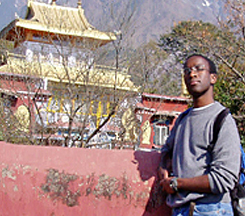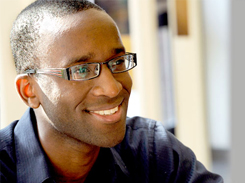Harvey's current position (2018): American Citizens Services Chief at U.S. Department of State in Kuwait (after serving previously as the Public Diplomacy Officer at the U.S. Consulate in Sapporo, Japan and as a Consular Officer in both Shanghai, China and Chennai, India).
Reason you chose this program: One of the main reasons I chose Indiana University was because I could study abroad in Japan for a year. I wanted to learn Japanese and Nanzan was the only academic year program available through IU at the time. There were AY programs available through other schools, but due to my plans to double major, I wanted to be sure that the coursework that I did in Japan would count towards my degree at IU. Regardless, study abroad in Nagoya was more appealing to me than Tokyo because I figured that since Nagoya was less (relatively speaking) metropolitan there would be fewer Japanese who could speak English. I was happy with my decision.
Best memory: I remember spending a lot of time in the school cafeteria socializing with the Japanese friends that I made on campus. Even though it has almost been 10 years since I went to Nanzan University I still keep in touch with some of those friends today!
How did your study abroad program affect you personally? Japan and Japanese have become a fundamental part of my life, and my parents and family are fully aware of that now. Before I went to Japan my parents had never even considered going anywhere overseas, but the first time my family traveled overseas was to visit me in Japan! I guess my stories had some impact on them. This past summer I completed an internship at the U.S. Embassy in Dar es Salaam and my parents talked about how much they want to visit. I guess they have caught the travel bug too.
What have been the longterm benefits of study abroad? When I first entered IU the only foreign country I had ever visited was Japan. During my exchange program to Japan I had an opportunity to visit nearby South Korea, and upon graduating I went back to Japan to work. My job in Japan took me to Singapore, India, and France for work and training, and I had an opportunity to work with an extremely diverse group of people. I have now visited more than 20 countries and thus have had the opportunity to experience many cultures. I have still never been to South America, however when I do, I feel confident that I will be ready, and I will be able to enjoy myself. My experiences with so many other cultures has taught me to be adaptable, patient, and slow to take offense. Once you have been around and experienced many cultures you begin to really understand that whatever is "common sense" or natural to you is certainly not universal. My travels have helped me to understand that my personal values are just that "personal", and not to be imposed on others. I also use my language skills today in school for research and also for work, as I do freelance translation. My wife is also Japanese, so I use the valuable language and cultural skills to keep in touch with her family. The advances I was able to make in understanding the Japanese way of doing things has been valuable in helping me to manage relationships with clients in Japan.
Explain the impact study abroad has in the workplace: Study abroad affected my career path in that I chose a job which placed me back in the same country that I chose for study abroad, and the language skills that I learned during study abroad were an essential factor in the employer's hiring decision. I got my first job with with GE Japan through the Boston Career Forum. This job fair is oriented towards people who wish to work in Japan after graduation, so my experience studying abroad was essential in convincing the employer that I really could "survive" in Japan for an extended period of time. Because I was able to show that I had lived in Japan for a full year during my university program, the employer felt reassured that I wouldn't be one to accept the job, move to Japan, only to quit after a short period of time because I couldn't handle the culture shock. It is important that the student knows how to effectively leverage their experiences when entering the job market. Different potential employers will have different things they are looking for in a candidate. They may not care that you can speak a foreign language, but they may value your proven ability to work with people from diverse backgrounds. It is up to the student to do their research to try to figure out the specific employer's needs.
What advice would you have for a student considering study abroad?Just do it! Sure, you can go abroad after graduating, but you can only be a college student abroad once. Being a student abroad is tons of fun. Sure it's also educational, you get to learn a new culture, a new language (in most places), and you can travel... but most of all, it's tons of fun. Being a student abroad is one of the best experiences that I have ever had. Some students do have trouble adjusting and get stressed or have problems during their study abroad experience, but from what I have seen they are by far the minority. Everything has its ups and downs, but if you go in with an open mind you'll be sure to have a great time. I have never met anyone who has regretting studying abroad during their time in university. I have however, met many people who regret not participating in a study abroad program. And if you have any say in the matter, choose to be abroad for one year rather than one semester, trust me on this one.



